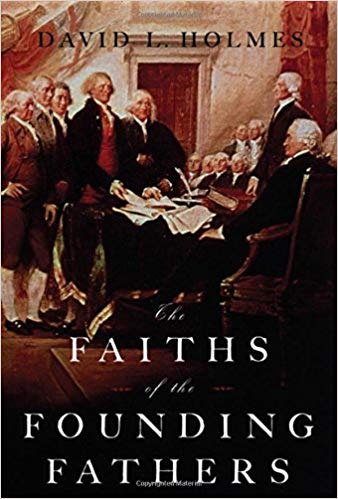The Faiths of the Founding Fathers, by David L. Holmes, Oxford University Press, 2006.

We are victims of the Chinese curse. We live in interesting times—or at least polarized times. Differing opinions have gravitated to the poles of a left–right axis, first in politics, then bleeding over into our religious discourse until, at least in some public debates, it has become impossible to discern which discursive practice is driving our disputes. This is especially apparent when we consider the hot–button issues, like abortion, euthanasia, penal justice, and education policy. One of the fields where left and right meet to do battle is history. It’s unclear to me why this is so. Regardless of whether left or right ultimately succeeds as arbiter of our identity, the desire to control our story may be grounded in a suspect understanding of history. Do they wish to tell the story in order to position themselves as worthy heirs to tradition? Or as the passive product of a deterministic process? Merit? Or destiny?
Whatever the reasoning, both left and right in America have sought to describe the nation’s character today according to the religious beliefs of its founding fathers. The right tries to demonstrate that these men were Christian and therefore America is a Christian nation. The left paints all the founding fathers with a deistic brush arguing that by the time they had founded the new nation, they had removed themselves from traditional Christianity. The right aims, perhaps, to bolster its brand of American exceptionalism: a global manifest destiny is a matter of divine right. However, it’s worth considering that the left’s insistence on a secular state is equally susceptible to the charge of exceptionalism: an enlightened secularism can be adopted as a position of moral superiority over and against the more primitive nations who draw their governing principles from a crude fundamentalism.
Into this fray saunters David Holmes who is unusual for his presentation of a balanced view, and who avoids the revisionist tendencies of both left and right. If he entertains personal loyalties, he doesn’t reveal them. Instead, following sound practices of historiography, he looks to founding fathers and asks: what does the evidence tell us? He applies this approach to six of the founding fathers: Benjamin Franklin, George Washington, John Adams, Thomas Jefferson, James Madison, and James Munroe. He considers their writings, both personal and public, their religious affiliations and habits, and contemporary reports such as church records and correspondence of friends.
It goes without saying that all six men were born into religious affiliations. Some, most notably Jefferson, were deeply engaged in matters of faith. Others, in particular James Munroe, present us with no personal access to religious views and seem utterly preoccupied with duties of state. Some, again most notably Jefferson, can be described unequivocally as Deist, while others bear ambiguous affinities. Perhaps the most closely debated matter is the personal religious views of George Washington. Popular history reports a devout Anglican/Episcopalian. This is particularly true of Mason Locke Weems (the creator of the cherry tree story) who offered the image of Washington praying in a wood at Valley Forge. While Weems is notorious for weaving fact and fiction, these stories seem to have stuck in the popular imagination. But the facts suggest something less devout. For example, although Washington attended church regularly, by the time he served as president, he no longer celebrated communion, leaving church early and sending for Martha later. And an examination of correspondence reveals a leaning towards Deistic religious views, avoiding words like “Father,” “Lord,” “Redeemer,” and “Savior” and favouring words like “Providence,” “Heaven,” the Deity,” “the Supreme Being,” “the Grand Architect,” “the Author of all Good,” and “the Great Ruler of Events.” The most likely inference is that Washington was a shrewd politician who allowed his conduct to remain sufficiently ambiguous that it could support favourable interpretations by all with whom he had dealings.
Holmes also conducts a more cursory survey of others, from Thomas Paine, who strayed about as far from orthodoxy as one can get without declaring oneself an atheist, and Ethan Allen, who was a virulent Deist, to Patrick Henry, who was an active Episcopalian, reading the Bible daily, and financing anti–Deist tracts. Other orthodox Christians included Samuel Adams, Elias Boudinot, and John Jay. Holmes also considers the religious views of the first ladies and their daughters. Most notable among these was Abigail Smith Adams who, it is clear, was at the very least the intellectual equal of the men with whom her husband circulated. She was strongly influenced by her father, a liberal Congregationalist minister, and by Deism, so that she ultimately converted to Unitarianism. It is difficult to say whether she was also influenced by her husband, or whether she was at least partially responsible for his shift from Congregationalism to Unitarianism.
In the end, we are left with an account of the founding fathers which is characterized by a plurality of views. It would be impossible to assert that America was founded upon a unified and coherent Christian vision. And that is perhaps the point of the first amendment. Perhaps it would be more fruitful to look to the one fact which bound the founding fathers—they were all lawyers. And legalism is at least as coherent an account of America as any religion.